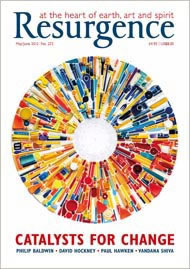For too long now, or maybe for just the right amount of time, I have been living in a way that I knew was not right for me.
To give you a bit of background, before I became the new Care Taker at The Yarner Trust – a Devon-based charity that promotes creative and sustainable living – I was a gardener and nurseryman. I spent a good 10 years tending plants, digging, conditioning soil and trying to put plants first whilst caring for the local environment.
I then reached the point when I wanted to know more, to get both the big picture view and a microscopic insight into the workings of plants and their place in the wider scheme of things. For me, that meant going, as a mature and paying student, off to university to study botany.
I had scraped through school and college and back then had been more interested in travelling, partying and visiting my friends who had gone off to ‘uni’ in various parts of the country than in studying for another three years. But now felt like the right time. I don’t know who was more freaked out by the sight of me in a white lab coat – my mates and family who had all gotten used to me as a bit of a Worzel-Gummage-meets-Jack-the-Lad character, or me. Whenever I caught sight of myself in the reflection of the fume cabinet with my goggles and lab coat on I would wonder if I was in an episode of Quantum Leap catching a view of me in another person’s body.
Sitting in class doing quantum physics, macro-evolution or organic chemistry, I just had to keep reminding myself that I had come into this with nothing to lose and with the mentality that you can do anything you put your mind to, even if you failed GCSE maths.
Sandwiching in a year at the Royal Botanical Gardens Kew, a plant collecting trip to Puerto Rico and a place on an EU-funded biodiversity mapping project, alongside being taught by some of the most distinguished lecturers in plant diversity, made me aware of four things:
1. The world we live in is facing an extremely difficult future.
2. There appears to be very little work being done to create realistic solutions to the problem of global change.
3. The entire human race and the whole biological world depend completely on the plant kingdom.
4. The only way to make a real impact is to practise what you preach.
For me this makes working at The Yarner Trust the perfect job. More specifically, in my new role I can help organise and run courses offering practical solutions that contribute towards a more sustainable lifestyle. And I can take what I have learned about the importance of respecting the natural world into schools, colleges, prisons, business forums, garden societies and anywhere else where there are people in a position to make a positive difference.
Finally, I can use a compost toilet, grow my own food, produce some of my own energy and hopefully by the end of my time here be able to build a sustainable home that will have a minimal impact on the Earth’s resources.
A question that always comes up when discussing the plight of humankind and the impending doom facing the natural world is “What can I do that will really make a difference?”
From what I have learnt and without going on to write another 365 Ways to Change the World, I would suggest the 10 easiest practical things to do are:
1. Change your energy supplier to a renewables one; they are not perfect but they are better than any large supplier which will more than likely have an investment in nuclear energy.
2. Build a pond and don’t over tidy your garden; maintain it organically and encourage neighbours and your local council to do the same. Use the term ‘biodiversity’ as often as possible – they won’t know what it means but they will know there are grants available for it.
3. Eat organic, seasonal fruit and veg. Try and start a community food swap-and-share group to spread the cost and waste. If you are not able to grow, then remember: your most powerful vote is with your pound.
4. Become vegetarian and ensure that all household and beauty products you use have not been tested on animals – the easiest way to reduce your carbon and ecological footprint.
5. Walk and cycle more. Make sure your car is a low-emissions one – and if it isn’t, get it modified to run on biofuel or hydrogen.
6. Move your money from a fat-cat big bank to an ethical cooperative.
7. Shop in charity shops, go to posh places to make sure you keep looking dapper and get used to wearing things that a) nobody else is wearing and b) help a good cause at the same time.
8. Remember when shopping that “there is no away” – everything you buy must be reusable or recyclable; otherwise it gets thrown away, i.e. buried.
9. Learn or relearn a craft and then set up a skills group so you can pass on that valuable knowledge.
10. Insulate yourself and your house by wearing twice as many clothes in the winter and ensuring there are no draughts in the house.







